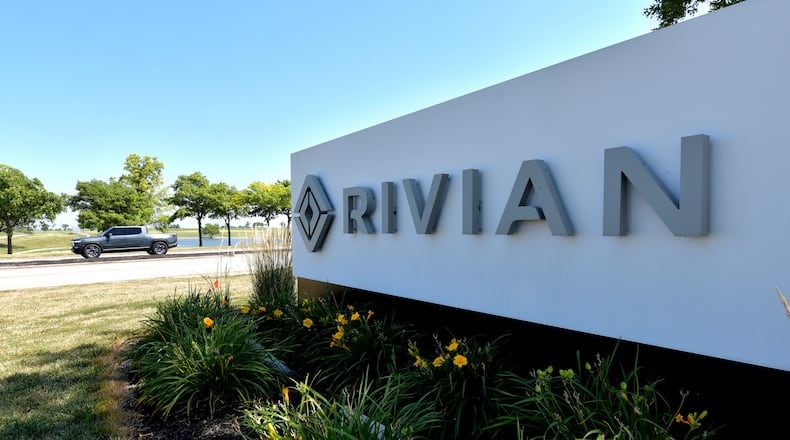The ambitious plan to build a $5 billion Rivian electric-vehicle plant became a surprising flashpoint in the Republican primary for governor earlier this year. Now one of the largest economic development projects in state history has become a dividing line in the general election, too.
It started when Democrat Stacey Abrams delivered an economic speech that included a veiled dig at the huge incentive package that Gov. Brian Kemp’s administration used to entice the automaker, which is losing money as it struggles with manufacturing issues.
“Now while the governor is comfortable promising billions to companies that have yet to turn a profit,” Abrams said, “he refuses to invest in our young people.”
Kemp fired back when he accused Abrams of hypocrisy. She celebrated the plant when it was announced in December and, Kemp said, supported state legislation that authorized incentives for large projects.
“In politics, you can’t have it both ways,” Kemp said. “You’ve got to stand up for what you believe in.”
Kemp’s administration offered a $1.5 billion package of state and local tax breaks, free land and other inducements to help score a Rivian project that promises to create 7,500 high-paying manufacturing jobs and establish the state as an EV hub.
By far the biggest piece of the package involves a local tax abatement worth more than $700 million that was approved by county officials.
Other generous perks were spelled out in Georgia law, including about $200 million from a recently altered “mega tax credit” program that offers incentives at $5,250 per job annually for five years for companies readying major investments in Georgia.
If Rivian fails to deliver on at least 80% of its promised jobs and investment by the end of 2028, the company is subject to claw-back provisions on a portion of the incentive package. The state says Rivian must maintain its 80% commitment through 2047.
“They haven’t gotten that money yet,” Kemp said of the job tax credits, “and they’re not going to get that money until they build that plant and hire that worker.”
Fallout over the deal unexpectedly factored into the Republican primary. Former U.S. Sen. David Perdue framed the public incentives as a naked election-year ploy conducted in the “dark of night” to help Kemp’s political career and said he would have nixed the project.
Kemp and his allies maintained what politicians usually say after landing a major project: that incentives just sweetened a deal that hinged on other factors, including Georgia’s talented workforce, logistics network and economic environment.
Perdue’s argument didn’t rev up many votes for him. Kemp routed his GOP rival in the counties surrounding the east Georgia tract where the Rivian plant would be built in the May primary. Still, many local residents remain worried the factory will dramatically change their rural community.
The Abrams campaign pointed to her economic agenda, which includes her proposal to legalize casino gambling to boost the HOPE scholarship. Her spokesman, Alex Floyd, said the state can bolster business development while expanding higher education opportunities.
“Stacey Abrams has a long track record supporting smart and accountable economic development projects,” Floyd said.
“And Stacey also believes we must invest in our children and provide access to a quality public education — including higher education — if we want to build a strong economy for our future.”
A note of disclosure
Cox Enterprises, owner of The Atlanta Journal-Constitution, owns about a 4% stake in Rivian and supplies services to it. Sandy Schwartz, a Cox executive who oversees the AJC, is on Rivian’s board of directors and holds stock personally. He does not take part in the AJC’s coverage of Rivian.
About the Author
The Latest
Featured




